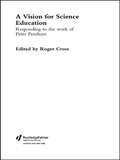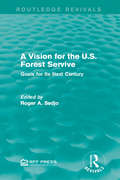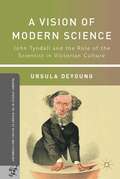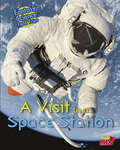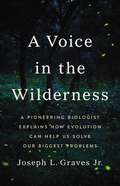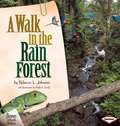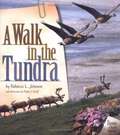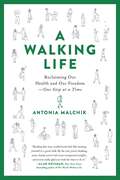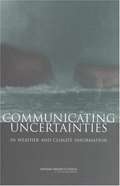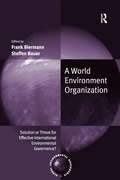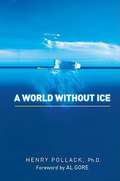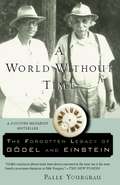- Table View
- List View
A Vision for Science Education: Responding to Peter Fensham's Work
by Roger CrossOne of the most important and consistent voices in the reform of science education over the last thirty years has been that of Peter Fensham. His vision of a democratic and socially responsible science education for all has inspired change in schools and colleges throughout the world. Often moving against the tide, Fensham travelled the world to promote his radical ideology. He was appointed Australia's first Professor of Science Education, and was later made a Member of the Order of Australia in recognition of his work in this new and emerging field of study.In this unique book, leading science educators from around the world examine and discuss Fensham's key ideas. Each describes how his arguments, proposals and recommendations have affected their own practice, and extend and modify his message in light of current issues and trends in science education. The result is a vision for the future of science teaching internationally.Academics, researchers and practitioners in science education around the world will find this book a fascinating insight into the life and work of one of the foremost pioneers in science education. The book will also make inspiring reading for postgraduate students of science education.
A Vision for the U.S. Forest Service: Goals for Its Next Century (Routledge Revivals)
by Roger A. SedjoOriginally published in 2000, this title is a collection of engaging, nontechnical contributions of scholars, policymakers, and forestry officials providing broad reflections on the agency’s past and future, contemporary perspectives about the use and stewardship of public lands, and insightful analyses about the science involved in the practice of scientific management. The authors offer challenging ideas for evaluating the performance of the U.S. Forest Service, reshaping its mission, enhancing its effectiveness, improving internal morale, and increasing public participation in the agency. It is a valuable resource for policymakers, professional foresters, and any student interested in Environmental Studies.
A Vision of Modern Science: John Tyndall and the Role of the Scientist in Victorian Culture (Palgrave Studies in the History of Science and Technology)
by Ursula DeyoungAn examination of a pivotal moment in the history of science through the career and cultural impact of the historically neglected Victorian physicist John Tyndall,establishing him as an important figure of the period, whose scientific discoveries and philosophy of science in society are still relevant today.
A Visit to a Space Station: Fantasy Science Field Trips (Fantasy Science Field Trips Ser.)
by Claire ThropBooks in the Fantasy Field Trips series take the reader on field trips to the most unlikely of destinations! In this book, strap yourself in as we prepare to blast off to explore a space station far above the Earth's surface. Our 'tour' includes a look at daily life on board, how astronauts exercise, work and even go to the toilet, and how astronauts and their supplies are transported between Earth and the space station.
A Visual Astronomer's Photographic Guide to the Deep Sky: A Pocket Field Guide (Astronomer's Pocket Field Guide)
by Stefan RumistrzewiczThis book is meant for observers who see a deep-sky object - either by star-hopping or by using a Go-To telescope - but do not observe it in detail because they don't know what to look for. It provides photographic images of all the objects discussed... not just images, but images that look exactly like the visual view through the eyepiece of telescopes of various apertures. Visually, deep-sky objects almost always look quite unlike the usual CCD images published in astronomical guides. The human eye doesn't see color at such low light levels, and the contrast of extended objects (such as nebulae and galaxies) is completely different. The author lives in a less-than ideal location for visual observing, with the city of London only about twenty miles to the south. He uses this to advantage, and amateur astronomers will find this book invaluable because it shows them what they will actually see from a typical suburban location, not a rare view under perfect skies.
A Voice in the Wilderness: A Pioneering Biologist Explains How Evolution Can Help Us Solve Our Biggest Problems
by Professor Joseph L Graves Jr.Why understanding evolution—the most reviled branch of science—can help us all, from fighting pandemics to undoing racism Evolutionary science has long been regarded as conservative, a tool for enforcing regressive ideas, particularly about race and gender. But in A Voice in the Wilderness, evolutionary biologist Joseph L. Graves Jr.—once styled as the &“Black Darwin&”—argues that his field is essential to social justice. He shows, for example, why biological races do not exist. He dismantles recent work in &“human biodiversity&” seeking genes to explain the achievements of different ethnic groups. He decimates homophobia, sexism, and classism as well. As a pioneering Black biologist, a leftist, and a Christian, Graves uses his personal story—his journey from a child of Jim Crow to a major researcher and leader of his peers—to rewrite his field. A Voice in the Wilderness is a powerful work of scientific anti-racism and a moving account of a trailblazing life.
A Walk In The Rain Forest
by Rebecca L. JohnsonTake a walk in the rain forest. This hot and humid biome is home to countless trees, animals, plants, and insects. Each and every insect, plant, and animal of the rain forest is dependent on all the others. Explore this exciting world of howling monkeys, calling birds, and endless rain.
A Walk Through The Heavens
by Wil Tirion Milton D. HeifetzA Walk through the Heavens is a guide to the pathways of the sky. It contains unique, simplified maps of the constellations and instructions on how to measure their sizes and the separations between them. Using this information you can find the constellations very easily and take a mind's eye journey from one constellation to its neighbours. The ancient myths and legends surrounding the constellations are retold, enriching our understanding of how historical peoples saw the awe-inspiring spectacle of a sky sprinkled with stars. Magically illustrated by Wil Tirion, this book does not assume that the reader has binoculars, and is ideal to inspire the young astronomer just starting out on a journey across the starlit skies.
A Walk in the Tundra (Biomes of North America)
by Rebecca L. JohnsonAn interactive, narrative tone invites readers to walk through America's biomes in this series by award-winning science author Rebecca L. Johnson. Supports the national science education standards Unifying Concepts and Processes: Systems, Order, and Organization; Unifying Concepts and Processes: From and Function; and Life Science as outlined by the National Academics of Science and endorsed by the National Science Teachers Association.
A Walking Life: Reclaiming Our Health and Our Freedom One Step at a Time
by Antonia MalchikFor readers of On Trails: an incisive, utterly engaging exploration of walking: how it is fundamental to our being human, how we've designed it out of our lives, and how it is essential that we reembrace it"I'm going for a walk." How often has this phrase been uttered by someone with a heart full of anger or sorrow? Or as an invitation, a precursor to a declaration of love? Our species and its predecessors have been bipedal walkers for at least six million years; by now, we take this seemingly arbitrary motion for granted. Yet how many of us still really walk in our everyday lives? Driven by a combination of a car-centric culture and an insatiable thirst for productivity and efficiency, we're spending more time sedentary and alone than we ever have before. If bipedal walking is truly what makes our species human, as paleoanthropologists claim, what does it mean that we are designing walking right out of our lives? Antonia Malchik asks essential questions at the center of humanity's evolution and social structures: Who gets to walk, and where? How did we lose the right to walk, and what implications does that have for the strength of our communities, the future of democracy, and the pervasive loneliness of individual lives? The loss of walking as an individual and a community act has the potential to destroy our deepest spiritual connections, our democratic society, our neighborhoods, and our freedom. But we can change the course of our mobility. And we need to. Delving into a wealth of science, history, and anecdote -- from our deepest origins as hominins to our first steps as babies, to universal design and social infrastructure, A Walking Life shows exactly how walking is essential, and how deeply reliant our brains and bodies are on this simple pedestrian act -- and how we can reclaim it.
A Watershed Runs Through You: Essay, Talks, and Reflections on Salmon, Restoration, and Community
by Freeman HouseThis anthology brings together a selection of essays, articles, and lectures that represent the work of environmentalist Freeman House, whose work built the involvement of local citizens in the restoration of watersheds in northern California. "Consequences flow downstream," he points out, "and we're all in their path." While much of House's work focuses on the restoration of wild salmon populations, he shows how all life is connected and interdependent. His restoration efforts in the Mattole Watershed contain blueprints for restoration efforts everywhere.
A Wealth Of Wild Species: Storehouse For Human Welfare
by Norman MyersThis book tells how our welfare is ever more intimately tied up with the welfare of the millions of species that share the One Earth home with us. It presents a synoptic review of the contributions that wild species make, and can make, to our daily lives.
A Weed is a Flower: The Life of George Washington Carver
by AlikiBrief text and pictures present the life of George Washington Carver, born a slave, who became a scientist and devoted his entire life to helping the South improve its agriculture.
A Well-Ordered Thing: Dmitrii Mendeleev and the Shadow of the Periodic Table, Revised Edition
by Professor Michael D. GordinDmitrii Mendeleev (1834–1907) is a name we recognize, but perhaps only as the creator of the periodic table of elements. Generally, little else has been known about him. A Well-Ordered Thing is an authoritative biography of Mendeleev that draws a multifaceted portrait of his life for the first time. As Michael Gordin reveals, Mendeleev was not only a luminary in the history of science, he was also an astonishingly wide-ranging political and cultural figure. From his attack on Spiritualism to his failed voyage to the Arctic and his near-mythical hot-air balloon trip, this is the story of an extraordinary maverick. The ideals that shaped his work outside science also led Mendeleev to order the elements and, eventually, to engineer one of the most fascinating scientific developments of the nineteenth century. A Well-Ordered Thing is a classic work that tells the story of one of the world’s most important minds.
A Whirlwind History of the Universe and Mankind: From the Big Bang to the Higgs Boson
by Thomas SanfordThis book is an essential read for everyone who is curious about how we humans came to exist and interested in understanding the science and social evolution that enabled us to establish that a Big Bang actually happened. The text uniquely explains the transitions between the various evolutionary plateaus: from the universe’s beginning in the Big Bang, to the emergence of Homo sapiens, highlighting the Mediterranean civilizations of Greece and Rome, the European Renaissance, the English industrial revolution, and the early European science discoveries, particularly those in physics, to the American Manhattan Project and the subsequent development of the new field of high-energy particle physics. This entire route, which eventually culminated in the discovery of the mass-giving Higgs boson, is clearly articulated in this monumental but concise work.
A Whole New Me
by Nicole GillMany insects and amphibians change shape—or metamorph—completely. Why do they do it?
A Wilder Kingdom: Rethinking Nature in Zoos, Wildlife Parks, and Beyond
by Ben A. Minteer and Harry W. GreeneZoos have always had a troubled relationship to what is considered the “real” wild. Even the most immersive and naturalistic zoos, critics maintain, are inherently contrived and inauthentic environments. Zoo animals’ diet, care, and reproduction are under pervasive human control, with natural phenomena like disease and death kept mostly hidden from public view. Furthermore, despite their growing commitment to conservation and education, zoos are entertainment providers that respond to visitors’ expectations and preferences. What would a “wilder” zoo—one that shows the public a wider range of ecological processes—look like? Is it achievable or even desirable? What roles can or should zoos play in encouraging humanity to find meaningful connections with wild animals and places?A Wilder Kingdom is a provocative and reflective examination of the relationship between zoos and the wild. It gathers a premier set of multidisciplinary voices—from animal studies and psychology to evolutionary biology and environmental journalism—to consider the possibilities and challenges of making zoos wilder. In so doing, the contributors offer new insights into the future of the wild beyond zoos and our relationship to wild species and places across the landscape in an increasingly human-dominated era.
A Wizard from the Start
by Don BrownA wizard from the start, Thomas Edison had a thirst for knowledge, taste for mischief, and hunger for discovery—but his success was made possible by his boundless energy. At age fourteen he coined his personal motto: “The More to do, the more to be done,” and then went out anddid: picking up skills and knowledge at every turn. When learning about things that existed wasn't enough, he dreamed up new inventions to improve the world. From humble beginnings as a farmer’s son, selling newspapers on trains and reading through public libraries shelf by shelf, Tom began his inventing career as a boy and became a legend as a man.
A Wizard: The Sixth Book In The Young Wizards Series (Young Wizards Ser. #6)
by Diane DuaneWhile Nita grieves over her mother's death, Kit tackles a challenge as dangerous as it is strange: Rescue a young wizard who has vanished on his first assignment. This new wizard is unlike any other--he's autistic and he's a magical prodigy. His power is enormous. Now Kit and his dog, Ponch, must track down the missing boy before the Lone Power finds him.
A Woman of Science
by Cardy Raper Remeline DamascoA STORY OF TRUE LOVE, DETERMINATION, SACRIFICE, AND DISCOVERY.A Woman of Science catalogues a decades-long journey of inspirational hardship and success that serves as a model for what women can do in a field largely dominated by men.Cardy Raper succeeded in becoming what she dreamed of as a young girl: a scientist. This beautifully written memoir details her struggles with the "boys' club" mentality of the scientific and academic worlds, her grief over her husband's premature passing, and above all her relentless, passionate efforts to unlock the secrets of mushroom gender and reproduction.Cardy Raper is not a woman to accept "no" for an answer. When her mother told her that she could be a nurse when she grew up, Cardy informed her in no uncertain terms that she was going to be a true scientist, making grand discoveries. Science was a man's world then. But despite lack of encouragement through college, Cardy learned what she needed. Then, at the University of Chicago, she met her mentor, John "Red" Raper, an equally stubborn and spirited scientist. They became soul mates, and, together, studied sexual reproduction in the amazing water mold Achlya. Cardy and Red married, had children, and continued to share their passion for science by unraveling the means of sexual reproduction in mushroom-bearing fungi. They moved to Harvard University and continued their research. Years later, Red's untimely death left Cardy alone in the competitive world of cutting-edge science. But Cardy carried on. She achieved her doctoral degree, learned the techniques of molecular genetics, and established her own laboratory. Ultimately, Cardy's discoveries helped to uncover the way in which genes found throughout the animal kingdom--including humans--encode molecules for mating, sight, smell, and taste.
A Workshop Summary Communicating Uncertainties in Weather and Climate Information
by Elbert W. FridayThe report explores how best to communicate weather and climate information by presenting five case studies, selected to illustrate a range of time scales and issues, from the forecasting of weather events, to providing seasonal outlooks, to projecting climate change.
A World Environment Organization: Solution or Threat for Effective International Environmental Governance? (Global Environmental Governance)
by Frank BiermannIn recent years, the debate on the establishment of a new international agency on environmental protection - a 'World Environment Organization' - has gained substantial momentum. Several countries, including France and Germany, as well as a number of leading experts and senior international civil servants have openly supported the creation of such a new international organization. However, a number of critics have also taken the floor and brought forward important objections. This book presents a balanced selection of articles of the leading participants in this debate, including both major supporters and opponents of creating a World Environment Organization. The volume is especially relevant to students and scholars of international relations, environmental policy and international law, as well as to practitioners of diplomacy, international negotiations, and environmental policy making.
A World Without Ice
by Henry PollackA cowinner of the 2007 Nobel Peace Prize offers a clear-eyed explanation of the planet's imperiled ice. Much has been written about global warming, but the crucial relationship between people and ice has received little focus-until now. As one of the world's leading experts on climate change, Henry Pollack provides an accessible, comprehensive survey of ice as a force of nature and the potential consequences as we face the possibility of a world without ice. A World Without Ice traces the effect of mountain glaciers on supplies of drinking water and agricultural irrigation, as well as the current results of melting permafrost and shrinking Arctic sea ice-a situation that has degraded the habitat of numerous animals and sparked an international race for seabed oil and minerals. Catastrophic possibilities loom, including rising sea levels and subsequent flooding of low-lying regions worldwide. A World Without Ice answers our most urgent questions about this pending crisis, laying out the necessary steps for managing the unavoidable and avoiding the unmanageable.
A World Without Soil: The Past, Present, and Precarious Future of the Earth Beneath Our Feet
by Jo HandelsmanA celebrated biologist's manifesto addressing a soil loss crisis accelerated by poor conservation practices and climate change &“Jo Handelsman is a national treasure, and her clarion call warning of a looming soil-loss catastrophe must be heard. Add her clearly written alarm to other future-shocks: climate change, pandemics, and mass extinctions.&”—Laurie Garrett, Pulitzer Prize winner and author of The Coming Plague: Newly Emerging Diseases in a World out of Balance &“The ground beneath our feet is slipping away as we lose the precious soil that sustains us. Jo Handelsman&’s writing—as rich and life supporting as the soil itself—is a riveting warning.&”—Alan Alda, actor, writer, and host of the podcast &“Clear+Vivid with Alan Alda&” This book by celebrated biologist Jo Handelsman lays bare the complex connections among climate change, soil erosion, food and water security, and drug discovery. Humans depend on soil for 95 percent of global food production, yet let it erode at unsustainable rates. In the United States, China, and India, vast tracts of farmland will be barren of topsoil within this century. The combination of intensifying erosion caused by climate change and the increasing food needs of a growing world population is creating a desperate need for solutions to this crisis. Writing for a nonspecialist audience, Jo Handelsman celebrates the capacities of soil and explores the soil-related challenges of the near future. She begins by telling soil&’s origin story, explains how it erodes and the subsequent repercussions worldwide, and offers solutions. She considers lessons learned from indigenous people who have sustainably farmed the same land for thousands of years, practices developed for large-scale agriculture, and proposals using technology and policy initiatives.
A World Without Time: The Forgotten Legacy of Gödel and Einstein
by Palle YourgrauFor 15 years two men, one made like a rapier, the other looking like a pile of laundry, walked together to their respective homes through the Princeton campus, talking as only consummate academics can. In his last years on earth, Einstein would go to his office just to have these walks home. Perhaps he could see a future in which Gödel, the rapier and the world's greatest logician, would run out of time and leave this planet weighing, by his own choice, only 65 pounds. In their walks Gödel concluded that time, which Einstein showed not to exist on theoretical worlds, did not exist in this one either. Yourgrau (philosophy, Brandeis U. ) explains the time they had together, and how Gödel's resulting paper on this crucial aspect of relativity has fared amongst physicists and philosophers. Annotation ©2004 Book News, Inc. , Portland, OR (booknews. com)
